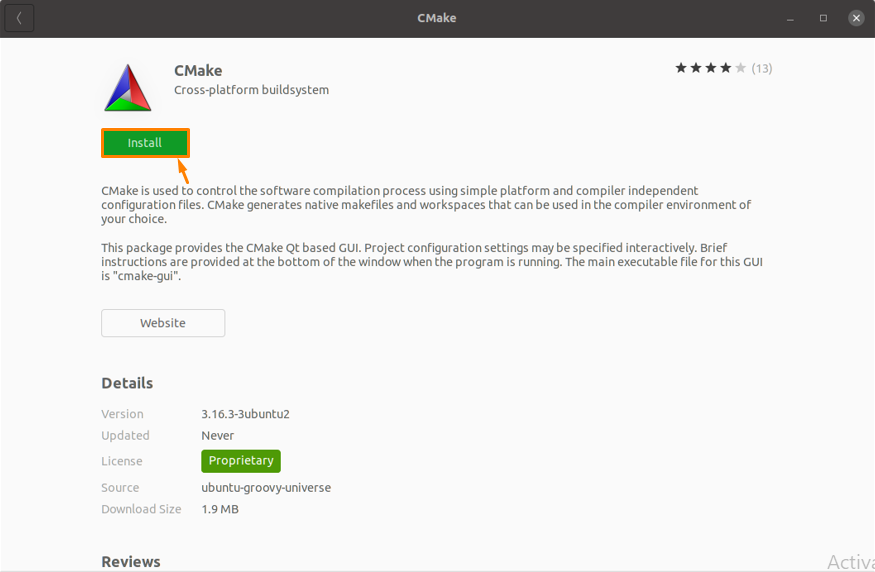
Install cmake ubuntu python install#
If there is an apt-get or pip3 install way of doing this that would be preferable, but I think I have exhausted all attempts found by google searching. I feel like I just need to tell python where to go to get the vtk module, is this correct? If so, where is it and what is its name and how do my make python link to it? Or am I missing something or doing something really stupid? Once installed I find I am still unable to get python files to run, still get the same error as mentioned above. I am able to build it, and I assume I am supposed to turn on python wrapping. Some relevant cmake options are BUILD_SHARED_LIBS=ON, CMAKE_BUILD_TYPE=Release, CMAKE_INSTALL_PREFIX=/usr/local, python3_EXECUTABLE=/usr/bin/python3.8, VTK_WRAP_PYTHON=ON, Python3_INCLUDE_DIR=/usr/include/python3.8, Python3_LIBRARY=/usr/lib/x86_64-linux-gnu/libpython3.8.so, and VTK_PYTHON_OPTIONAL_LINK=ON. I am familiar with building Kitware (Cmake and Paraivew) stuff from source so I did so: git clone

I have been searching for ways to sort this out all over the net, but without success. Without fail they all are unable to locate the package. I have tried apt-get python-vtk, pip3 install vtk and pretty much all the standard terminal install commands. Since then all my import vtk lines don't work, ModuleNotFoundError: No module named 'vtk' Now we push from assumption, that make install script installs into custom dir just same contents you want to remove from somewhere else (usually /usr/local). Install project to custom directory (just run make install again). Running programs built with the distribution.I recently updated my system to Ubunutu 20.04, and my python is now 3.8. For CMake, you can go to your build dir, open CMakeCache.txt, and fix CMAKEINSTALLPREFIX value. These three files are shipped with the single-buildĭistribution and they, or later versions of them, must be available when Later versions of C++ runtime libraries (libstdc++.so, libgcc_s.so, Only available in later g++ compiler versions (we’re not tied to the This allows us to take advantage of optimizations and language features The distribution is built using a later g++ compiler toolchain. There are several ways to install CMake, depending on your platform. Setting up the dependencies on Ubuntu Setting up the dependencies on Fedora Build Instructions (Unix). Note that I filed a bug about this issue. A workaround is to add set (PythonADDITIONALVERSIONS 3.4) before the findpackage statement. Means that the distribution will work across most modern Linux distributions. The problem seems to be that Ubuntu 14.04 installs Python 3.4 by default and the CMake version from Ubuntu (2.8) only searches up to Python 3.3. Since Linux guarantees forwards compatibility, this This means that the libraries will only depend on older Linux systemįunctions (e.g. This distribution is built on the oldest version of Linux we support. Take advantage of the Linux cross-version compatibility guarantees in suchĪ way that executables built using the single-build distribution will runĪcross many common Linux platforms without rebuilding.


Maximally-compatible with Linux-based systems. Add the following code: helloworld/main.c. Create a new directory for storing project files and navigate to this directory: mkdir helloworld & cd helloworld. I ran pip install cmake, and then pip install dlib.
Install cmake ubuntu python windows#
I am using windows and have a python environment that I am installing the requirements to. Checkout the CMake documentation for details. Once installation is completed, we can check CMake version: cmake -version Testing CMake. 5 Answers Sorted by: 30 Here is the main thread solution of this error I ran into this issue as well. Then enter the following command to compile OR-Tools: cmake -build build -config Release -target all -j -v. The single-build Linux distribution contains libraries built to be To build the source code, open a terminal and navigate to the directory where you extracted the files. Cmake_minimum_required ( VERSION 3.21.0 ) set ( CMAKE_CXX_FLAGS "$ /examples/ExamplesTemplate.cmake )


 0 kommentar(er)
0 kommentar(er)
